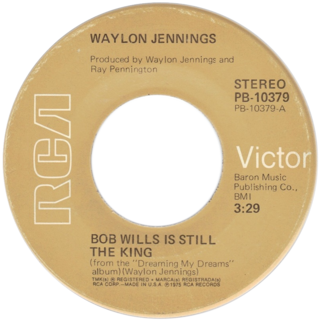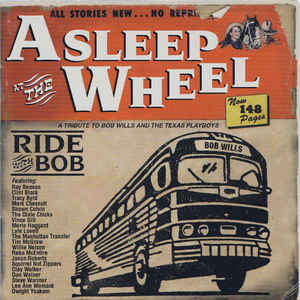Related Research Articles

James Robert Wills was an American Western swing musician, songwriter, and bandleader. Considered by music authorities as the founder of Western swing, he was known widely as the King of Western Swing. He was also noted for punctuating his music with his trademark "ah-haa" calls.

Asleep at the Wheel is an American country music group that was formed in Paw Paw, West Virginia, and is based in Austin, Texas. The band has won nine Grammy Awards since their 1970 inception, released over twenty albums, and has charted more than 21 singles on the Billboard country charts. Their highest-charting single, "The Letter That Johnny Walker Read", peaked at No. 10 in 1975.

A Tribute to the Best Damn Fiddle Player in the World is the eleventh studio album by Merle Haggard backed by The Strangers, released in 1970.

"To Each His Own" is a popular song with music written by Jay Livingston and lyrics by Ray Evans. It is the title song of the movie of the same name and was published in 1946 by Paramount Music. The duo were assigned to write this song after film composer Victor Young turned it down.
"Corrine, Corrina" is a 12-bar country blues song in the AAB form. "Corrine, Corrina" was first recorded by Bo Carter. However, it was not copyrighted until 1932 by Bo Carter, along with his publishers Mitchell Parish and J. Mayo Williams.

"Oklahoma Hills" is a song written by Woody Guthrie. In 2001 it was named the official Folk Song of the state of Oklahoma.

"I'll See You in My Dreams" is a popular song and jazz standard, composed by Isham Jones, with lyrics by Gus Kahn, and published in 1924. It was recorded on December 4 that year, by Isham Jones conducting Ray Miller's Orchestra. Released on Brunswick Records, it charted for 16 weeks during 1925, spending seven weeks at number 1 in the United States. Other popular versions in 1925 were by Marion Harris; Paul Whiteman; Ford & Glenn; and Lewis James; with three of these four reaching the Top 10.
"Faded Love" is a Western swing song written by Bob Wills, his father John Wills, and his brother, Billy Jack Wills. The tune is considered to be an exemplar of the Western swing fiddle component of American fiddle.
William Leon McAuliffe was an American Western swing guitarist who was a member of Bob Wills and His Texas Playboys during the 1930s. He was posthumously inducted into the Rock and Roll Hall of Fame as a member of that band, and was a member of the Steel Guitar Hall of Fame.
"San Antonio Rose" is a swing instrumental introduced in late 1938 by Bob Wills and His Texas Playboys. Quickly becoming the band's most popular number, Wills and band members devised lyrics, which were recorded on April 16, 1940, and released on Okeh 5694 in August as "New San Antonio Rose". Despite having completed a lengthy Hillbilly/Folk chart run in 1939, which culminated at #1, it quickly rose to the top again, in early 1941. It went on to become the band's theme song for the next forty years, reverting to its original title.
"Stay a Little Longer" is a Western swing dance tune written by Bob Wills and Tommy Duncan. The title comes from a refrain in the chorus:
"Sugar Moon" is a Western swing love song written by Bob Wills and Cindy Walker.
"New Spanish Two Step" is a Western swing standard based on a traditional fiddle tune, "Spanish Two Step". Bob Wills and His Texas Playboys recorded the latter on September 23, 1935, and released it on Vocalion 03230 in 1936. Ten years later, Wills and Tommy Duncan added lyrics and recorded it again on April 25, 1945, releasing it on Columbia 36966 in April 1946 as "New Spanish Two Step". It stayed on the charts for 23 weeks, reaching number one on the Folk-Jukebox chart for 16 weeks. Both versions were one of the band's signature songs.
"Time Changes Everything" is a Western swing standard with words and music written by Tommy Duncan, the long-time vocalist with Bob Wills and the Texas Playboys. Written as a ballad, the lyrics tell of a failed romance and of the hurt that has healed. Each verse ends with the phrase "Time changes everything".
"Ida Red" is an American traditional song of unknown origin, made famous in the upbeat 1938 version by Bob Wills and his Texas Playboys, the primary inspiration for Chuck Berry's first big hit "Maybellene." It is chiefly identified by variations of the chorus:
"Cherokee Maiden" is a Western swing love song written by Cindy Walker. "Cherokee Maiden" was one of Walker's first hits when it was recorded by Bob Wills and The Texas Playboys in 1941.
"Bubbles in My Beer" is a Western swing song that was originally recorded by Bob Wills and His Texas Playboys in 1947. It later became a standard that has been performed by many country music artists. One critic of drinking songs ranks it number 20, calls it "the ultimate self-pity song," and credits it with "setting the tone for a whole genre of songs about drowning sorrows in the barroom."

"Bob Wills Is Still the King" is a song written and performed by American country music artist Waylon Jennings, as a tribute of sorts to the Western swing icon Bob Wills.

Tribute to the Music of Bob Wills and the Texas Playboys is the 12th studio album and first tribute album by American country band Asleep at the Wheel. Recorded at studios in Austin, Texas, and Nashville, Tennessee, it was produced by the band's frontman Ray Benson and released on October 25, 1993, by Liberty Records. The collection features recordings of songs made popular by Western swing group Bob Wills and His Texas Playboys, a major influence on Asleep at the Wheel.

Ride with Bob: A Tribute to Bob Wills and the Texas Playboys is the 15th studio album and second tribute album by American country band Asleep at the Wheel. Recorded between June 1998 and March 1999 at studios in Austin, Texas, and Nashville, Tennessee, it was produced by the band's frontman Ray Benson and released on August 10, 1999, as the band's only album on DreamWorks Records. The album is another tribute to the music of Bob Wills and His Texas Playboys.
References
- Whitburn, Joel. The Billboard Book of Top 40 Country Hits. Billboard Books, 2006. ISBN 0-8230-8291-1